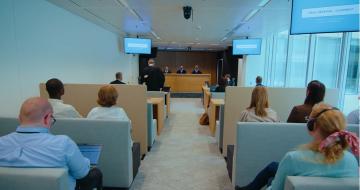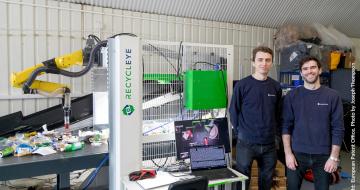Table of Contents
Counterfeiting and piracy : a reality...
Intellectual property rights play an key role in our economy. Indeed, they encourage creativity, research and allow companies to strengthen their competitive position in the global economy. However, counterfeiting and piracy jeopardise the economy system. And increasingly organisations (often criminal) make huge profits from counterfeiting creations and signs that are protected by intellectual property rights and/or setting up a trade in these counterfeit products.
Counterfeiting and piracy are concepts that are generally used to indicate an infringement of intellectual property rights, namely acts (use, manufacturing, or sale, for example) carried out without the consent of the intellectual property right holder. In principle, all products that can be sold nowadays are potential victims of counterfeiting. Therefore, counterfeiting is not limited to the category of luxury products or clothing. Even toothpaste, washing-up liquid and smartphone accessories are counterfeited on a commercial scale.
The counterfeiting market has become increasingly professional. Small illegal workshops were replaced by an actual industry equipped with high-tech equipment and its own distribution network. Sometimes, counterfeit products appear on the market before the authentic products are sold.
... with harmful consequences on our economy
The consequences of the counterfeiting market are not only detrimental to intellectual property right holders, but also to society.
Counterfeiting deprives businesses of the fruit of their reputation, their positive image, and their investments in terms of research and development, innovation, and marketing. It does not only affect the businesses themselves, the whole society also suffers from the effects of counterfeiting.
The loss of revenue as a result of counterfeiting around the world is estimated to be hundreds of billions of euros. The counterfeiting market is believed to represent 5 to 10% of global trade. This leads to a significant loss of tax and customs revenue.
Job losses in the European industry as a result of counterfeiting are estimated to stand at more than 700,000 jobs. Furthermore, counterfeiting favours the development of uncontrolled and sometimes illegal working environments and the exploitation of vulnerable workers.
Also, consumer health and safety is at risk. The products are made without any controls by the competent authorities and do not always meet quality standards. Counterfeit drugs are a case in point.
Above all, counterfeiting and piracy have a negative impact on innovation and investment. Businesses are less inclined to invest in research and development when results are not effectively protected.
Therefore, great importance is attached to the fight against counterfeiting. Subsequently, in the wake of international and European treaties, the Belgian legislator provided for a variety of actions in order to prevent infringements.
How to tackle counterfeiting?
A good understanding of intellectual property leads to respect for it, in the sense that awareness of the negative effects of counterfeiting (on the economy, employment, health and safety) leads consumers not to buy counterfeit products. According to the 3rd edition of a study by the European Union Intellectual Property Office (EUIPO) on European citizens' attitudes and behaviour towards intellectual property, the majority of citizens today agree it is important that those who invest in innovation have their rights protected and are paid for their work, which is a gradual but encouraging change.
In addition, it is important for businesses to pay sufficient attention to complying with their intellectual property rights. The acquisition and possession of these rights constitute major assets for a company. Without sufficient efforts to ensure compliance with these rights by third parties and constant monitoring of unauthorised uses, these rights risk losing their value and, thus, their effectiveness. The legislator provided for a series of actions that intellectual property right holders can use to fight infringements of their rights.
Note that before taking act against counterfeiters, you are strongly advised to contact an expert. Insofar as it is generally a litigation procedure before a court, it is best to hire a lawyer. This is particularly important since the subject of intellectual property rights has been centralised at certain courts (generally commercial courts based at an appeal court) and legal proceedings cannot be filed before all courts.
Do you think you have ever bought a counterfeit product?
As consumers, you are facing more risks than ever from counterfeit products.
- In 2020, 8% of Belgian consumers have been misled into buying a counterfeit product.
- Counterfeit products can pose serious health and safety risks.
- The share of counterfeit products in EU imports is 6.8%, worth €121 billion.
- Worldwide, the volume of counterfeit pharmaceuticals traded is worth €4 billion.
Find out more in this video.
Young people, piracy and counterfeiting
In 2021, among Belgians aged 15 to 24:
- 29% have intentionally accessed pirated content (mainly films, TV series and music);
- 43% have intentionally bought at least one fake product (mainly clothes, electronic devices and footwear).
Helping young people make informed choices is key.
Find out more in this video and infographic.

Study on the phenomenon of counterfeiting in Belgium
The fight against the counterfeiting of products and services protected by intellectual property rights remains of paramount importance, as it affects society as a whole. Counterfeiting has a major socio-economic impact in the European Union and in Belgium, causing substantial economic losses and job losses and posing a potential threat to health and the environment.
A study carried out jointly by the OECD and the EUIPO shows that our country is one of the main destinations for dangerous counterfeit goods and that it is part of a privileged route for the distribution of these goods in the other Member States of the European Union.
This study commissioned by the FPS Economy analyses the main trends in counterfeiting in Belgium and presents an overview of existing national and European measures to combat counterfeiting. It will make it possible to reassess and further improve the approaches and instruments used in the fight against counterfeiting in view of the growing challenges involved, particularly in terms of coordination between stakeholders. After examining best practice, the study puts forward nine recommendations as possible ways of improving the fight against counterfeiting in Belgium.
Read the study on the phenomenon of counterfeiting


